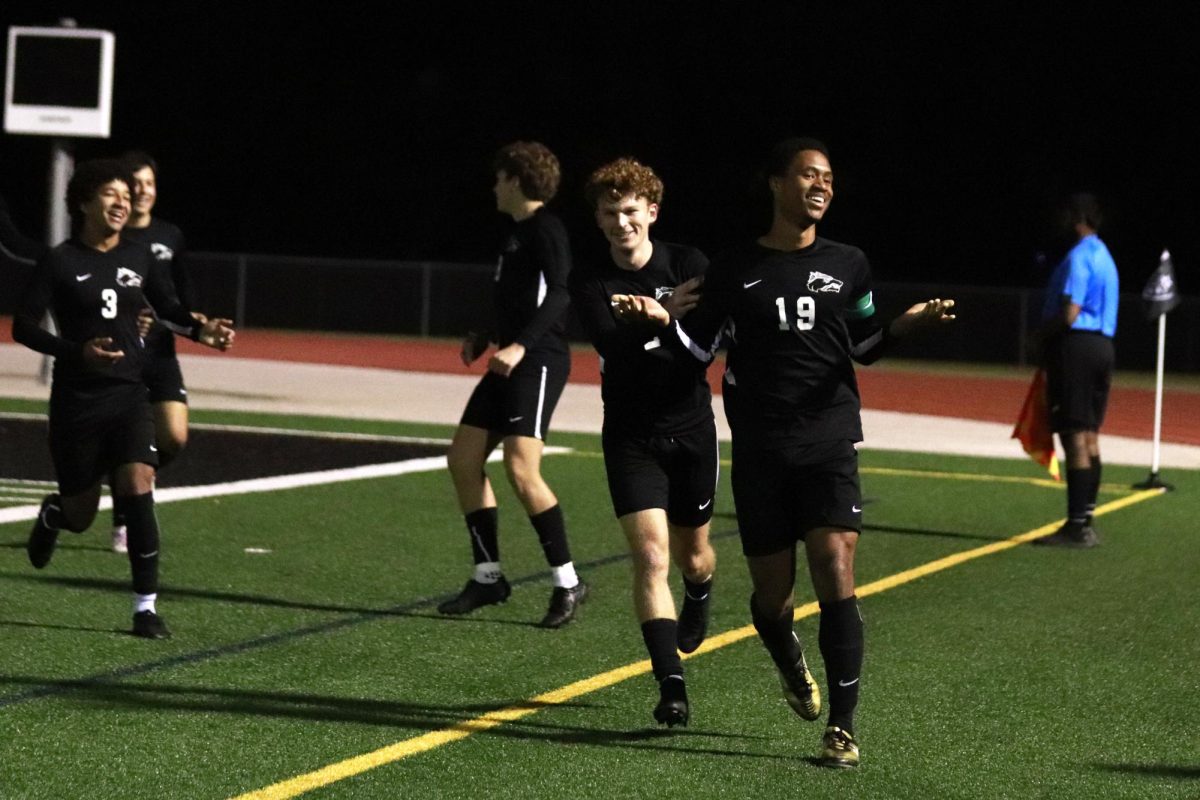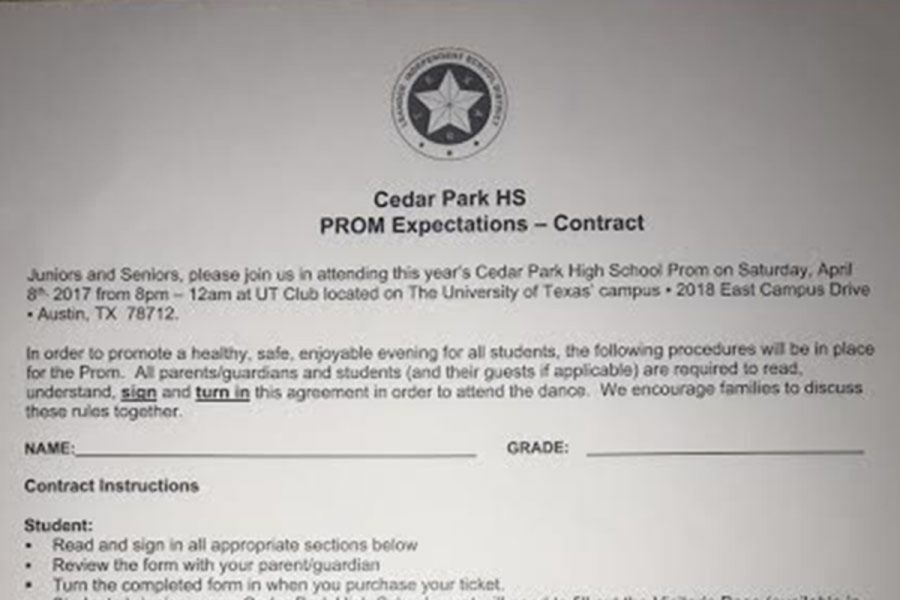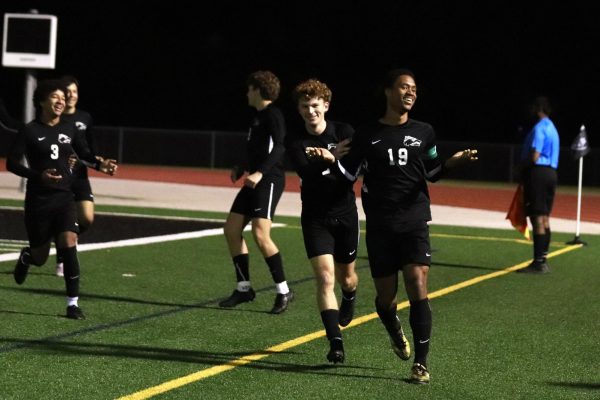PROM Expectations Contract Elicits Different Reactions From Students
March 27, 2017
The “PROM Expectations — Contract” has stirred a conversation at CPHS, eliciting different reactions from students. Some students appreciate the contract, as it warrants them a safe night. Others detest the contract, pronouncing it unneeded.
Prom committee president, senior Lexxi Clinton welcomes the contract, as it will prevent students from making bad decisions or suffering because of someone’s choice.
“In light of Shattered Dreams and the rate at which young adults die from drunk driving, the school should enforce the actuality of a drug/alcohol free prom,” Clinton said.
The contract was created and implemented by the administration as a result of issues in previous years.
“I think the administration is being more conscious of our stress levels and how teens use drugs and alcohol as a coping mechanism,” Clinton said.
One of the penalties of not abiding by the contract is the inability to walk at graduation, though Clinton does not feel like that will stop students from breaking the agreement.
“I personally don’t think they [students] will abide, but I think they should consider what is at stake if they make a poor choice and someone ends up hurt or in trouble,” Clinton said. “We all want to be able to walk at graduation.”
While Clinton may feel that the contract still allows prom to continue as it always has, many students feel that it stops them from embracing the true concept of prom, such as senior Robin Kay.
“It doesn’t promote the fun that prom is supposed to represent,” senior Kay said. “I don’t believe the school should regulate dancing unless it is something extremely vulgar. We’ve already signed a code of conduct before the school year began so that makes this contract redundant and more of a discouragement to attend.”
Though Kay will not be attending prom, he agrees with Clinton in that students will be more likely to bypass the contracts rules.
“I believe that it’s redundant to make us sign a contract in regards to our behaviors because any person with common sense should know what not to do,” Kay said. “Secondly, people are going to find ways to sneak things in anyway. We’re not in middle school, so why regulate a school function like we’re in middle school when the majority of us are 17 or 18.”
Kay is not alone in his thinking, as junior Reagan Sherrill shares similar thoughts about the contract.
“I mean I see how the intentions are good, but from how everybody I know is reacting, it’s not the best,” Sherrill said. “It’s kind of driving a lot of people away. Not because their intentions are to drink, but just because it feels like we’re all going to be “helicoptered” and that just makes kids uncomfortable in general. I don’t think it was the best way to go about things if they are trying to tackle that concept of kids drinking.”
Shattered Dreams aired last week, for students in all grades to watch and learn from. Sherrill feels that this has a larger impact in student’s choices regarding drugs and alcohol than the contract does.
“I am not really sure [about something else the administration could implement], but I think that Shattered Dreams happening just a couple of weeks ago should’ve hopefully impacted students when it comes to that,” Sherrill said.

![Posing with their UIL State Trophy, the Robolobos Van Halen Team beams with excitement after their win. “It was a team effort,” junior Noah Vo said. “I was happy because something happened in the first match and the match was also really close. So [when] they finally revealed it, I was pretty happy.” Photo courtesy of Amy Lovelace](https://cphswolfpack.com/wp-content/uploads/2025/05/IMG_0910-EDIT-1200x723.jpg)

![Broadcast, yearbook and newspaper combined for 66 Interscholastic League Press Conference awards this year. Yearbook won 43, newspaper won 14 and broadcast took home nine. “I think [the ILPC awards] are a great way to give the kids some acknowledgement for all of their hard work,” newspaper and yearbook adviser Paige Hert said. “They typically spend the year covering everyone else’s big moments, so it’s really cool for them to be celebrated so many times and in so many different ways.”](https://cphswolfpack.com/wp-content/uploads/2025/05/edited-ILPC.jpg)













![Bringing her arm over her head and taking a quick breath, junior Lauren Lucas swims the final laps of the 500 freestyle at the regionals swimming competition on date. Lucas broke the school’s 18-year-old record for the 500 freestyle at regionals and again at state with a time of 4:58.63. “I’d had my eye on that 500 record since my freshman year, so I was really excited to see if I could get it at regionals or districts,” Lucas said. “ State is always a really fun experience and medaling for the first time was really great. It was a very very tight race, [so] I was a bit surprised [that I medaled]. [There were] a lot of fast girls at the meet in general, [and] it was like a dogfight back and forth, back and forth.” Photo by Kaydence Wilkinson](https://cphswolfpack.com/wp-content/uploads/2025/03/Kaydence-2.7-23-edit-2.jpg)
![As the support team sits and poses for a photo in the cafeteria with the counseling team they eagerly wait to start their day. "We [all] seem to be a team, I get up every day and there's days where I don't want to go to work today, but I'm thankful that I have a job and I'm blessed to have what I have," Christopherson said. Photo Courtesy of Julie Weltens.](https://cphswolfpack.com/wp-content/uploads/2025/01/AF9E8470-10D7-4C91-BF28-EC8F86BAB66C-1200x852.jpeg)
![Officer Stephanie Cash is in her second year as an SRO at CPHS. “Seeing [students] grow over the years has been kind of cool,” Officer Cash said. “Freshmen that [are] all over the place and then in the next couple of years get a little more squared away and go to class and do work and start thinking about the future. Being a part of a student's growth is the best way to measure my success as an SRO.” Photo Courtesy of Cedar Park Police Department's PIO, Alicia Gallagher.](https://cphswolfpack.com/wp-content/uploads/2024/12/CPHS-SRO-900x1200.jpg)



![Taking a breath as he raises his arm up and out of the water, sophomore Kaden Padilla swims the 500 freestyle at the UIL state meet on Feb. 21-22. Padilla placed 10th overall and second in the consolation final in the event, dropping two seconds. “My family was there, so being able to drop time for them was really special,” Padilla said. “It was awesome [finding out I advanced to the consolation finals]. I wasn’t expecting it, and I was very surprised. My parents being there definitely made me a lot happier knowing they got to see me swim in finals.” Photo by Skyler King.](https://cphswolfpack.com/wp-content/uploads/2025/03/kaden-padilla.jpg)

![Three defenders try to stop senior point guard Hope Edwards before the ball leaves her hands. The girls basketball team faced Liberty Hill on Feb 21, losing 58-40. “[My season was] definitely bittersweet,” Edwards said. It's definitely sad [because] I'm gonna miss all my teammates, my coaches and just the whole CP environment.”](https://cphswolfpack.com/wp-content/uploads/2025/03/julia-128-1200x800.jpg)

































